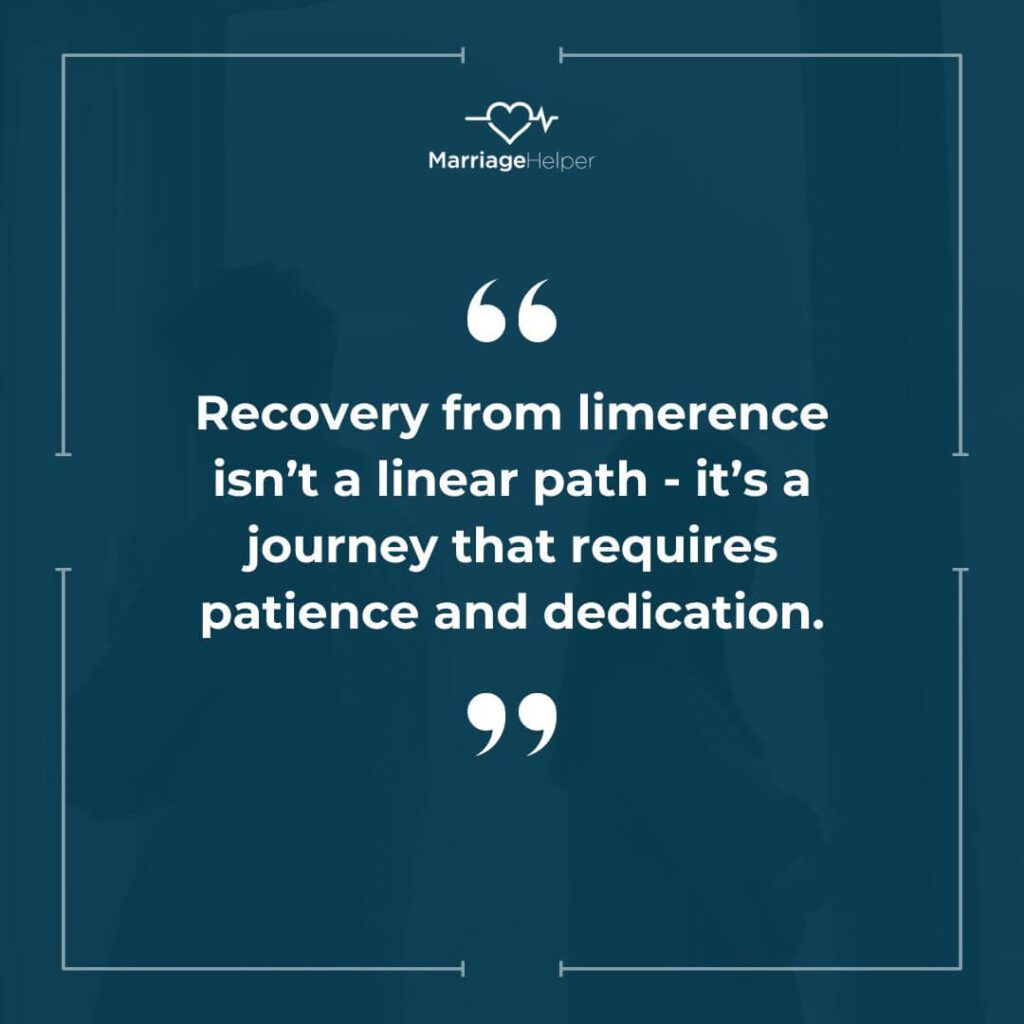
Limerence is an intense, emotional, and obsessive infatuation that often comes with an affair.
For the spouse in the throes of limerence, it brings a whirlwind of emotions.
For the other spouse, it can be a time of confusion and pain.
The marriage reaches a critical turning point where decisions need to be made – either you stay together or walk away.
When the limerent spouse does decide to end the affair or obsessions, there’s a window of opportunity for healing and rebuilding your relationship.
But limerence recovery is not an easy process.
It requires a strong foundation of trust, understanding, and a willingness to work through the difficulties together.
In this article, we’ll explore how couples can navigate the aftermath of limerence and offer practical steps for both spouses to recover.
Get the help your marriage needs today – explore our workshops and resources to save your relationship.
Steps Towards Limerence Recovery as a Couple
While recovering from limerence is no small task, it is more than possible. In this section, we’ll explore some strategies you can begin implementing in your marriage right away to begin the road to healing.
Start an Open Dialogue
Admitting an affair or attraction to someone outside your marriage is a vulnerable yet crucial step in rebuilding a marriage.
For the spouse who has experienced limerence, this dialogue provides a platform to openly acknowledge the affair and its repercussions.
It’s important for this spouse to be honest about their emotions and the reasons behind the infatuation.
This level of transparency is challenging. But it helps the non-limerent spouse understand what happened.

If your spouse is in limerence with someone else, this dialogue isn’t the time to talk negatively about the person they were involved with.
Doing so will only push your spouse away from you.
Instead, focus on your internal relationship. Create a safe space where you both feel seen and heard.
Adjust Your Relationship Dynamics
Limerence can alter the way spouses interact with each other, often leading to an imbalance in the relationship.
Take time to discuss and redefine your roles in the marriage. The key is to make it fair and respectful to both.
This might involve redistributing your household or parenting responsibilities.
Keep in mind that each spouse may also have developed different needs during the period of limerence.
Recognize these needs and work together to fulfill them. This requires a deep level of understanding and empathy from both sides.
Now, this doesn’t mean agreeing to your spouse’s every request.
It involves finding a middle ground where both spouses feel their needs and boundaries are respected.
Distraction and Substitution
Recovering from the different stages of limerence isn’t a linear path. Setbacks are bound to happen.
“Recovery from limerence isn’t a linear path – it’s a journey that requires patience and dedication.”

On some days, you might feel good about your decision to stay in the marriage. But not so much on others.
What you need is to redirect your mental and emotional energy to other things.
Engaging together in shared hobbies or interests helps the limerent spouse shift their focus away from the object of their infatuation.
It stops them from further ruminating on past interactions or “what ifs.” It also lessens the risk of contacting the target of your spouse’s limerent attention.
Consider exploring new activities that you both might enjoy, or revisit past interests that brought joy to your marriage.
Whether it’s a sport, a creative activity like painting or music, or a group activity like a book club or cooking class.
Rebuild Trust with Patience and Understanding
Rebuilding trust after an affair is no easy task.
But it is possible through a series of small, consistent actions over time.
For the non-limerent spouse, offering forgiveness and understanding is crucial, even in the face of hurt and confusion.
This doesn’t mean ignoring your feelings or forgetting the pain. It’s about acknowledging it and making a conscious decision to heal your marriage.
Educate yourself on what limerence is and how it’s affecting your spouse.
This can provide context for your spouse’s behavior, helping you see the situation more clearly and respond with empathy.
For the spouse who experienced limerence, show consistent transparency and reliability in your actions. It’s your responsibility to care for yourself and your marriage if you really want to regain your spouse’s trust.
Consider Getting Guidance from Professionals
Sometimes, it may not be enough to recover from limerence on your own.
Seeking help from professionals can be an invaluable step in healing and strengthening your marriage.
Couples coaching is particularly beneficial as it helps both spouses delve into the underlying causes of limerence.
Understanding these root issues is crucial for long-term recovery and for preventing similar patterns in the future.
A coach can guide you in uncovering emotional triggers, addressing issues related to self-esteem, or exploring past experiences that may have influenced your current relationship.
Marriage Helper for instance offers practical workshops and online toolkits for managing the ups and downs of limerence recovery.
We can help you set realistic boundaries, deal with setbacks in a healthy way, and maintain a positive perspective on your marriage’s future.
How Long Does It Take to Get Over Limerence?
Recovering from limerence is deeply personal and varies from one person to another. There is no set timeline for moving past these intense feelings.
Typically, limerence can last anywhere from a few months to several years.

However, the process of recovery speeds up when the individual actively engages in understanding and addressing their emotions.
With enough time and effort, a limerant spouse can gradually recover from their infatuation.
What Does a Balanced Relationship Look Like After Limerence Recovery?
A marriage that has moved beyond limerence often comes out stronger and more connected.
This renewed balance is marked by better communication, with both spouses becoming more open, honest, and empathetic with each other.
They gain a deeper understanding of their own emotional needs and how to express them constructively.
The trust that might have been shaken is steadily rebuilt on a foundation of consistency and transparency.

In this renewed relationship, both spouses typically engage more in activities that they enjoy together, strengthening their bond and rediscovering joy in each other’s company.
They find a balance in their roles and responsibilities, appreciating each other’s contributions.
Both spouses are ready to face future challenges with confidence and a shared commitment to maintaining a healthy, loving relationship.
Recover from Limerence with Marriage Helper
Recovering from limerence is not just about overcoming the immediate obstacles. It’s about building a foundation for a lasting and fulfilling spouseship.
For couples experiencing the struggles of limerence, remember that you are not alone.
Many have gone through it and emerged stronger on the other side.
If you find yourselves needing more support and guidance, Marriage Helper offers a range of resources to help couples in their limerence recovery.
Our workshops offer focused and transformative guidance for you and your spouse – even if you’re separated or your spouse wants out. You can join our online membership to meet an interactive community of couples who might be going through the same problems. You’ll get access to educational resources and tools, all aimed at nurturing and sustaining a healthy, loving relationship.





